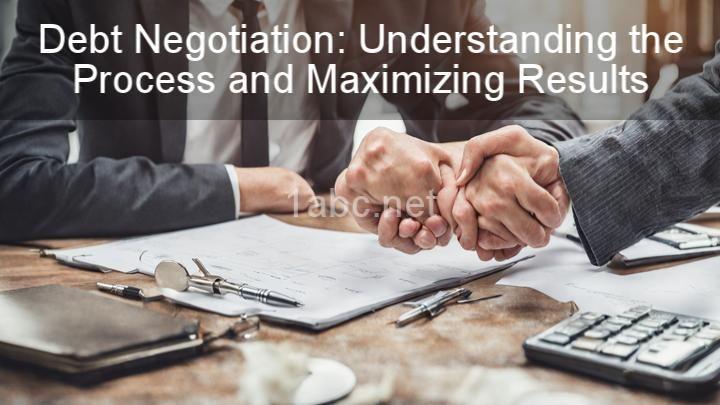Debt Settlement vs. Debt Consolidation: Which is Right for You?

Introduction:
Welcome to our friendly guide on deciding between debt settlement and debt consolidation. We understand that dealing with debt can be overwhelming and stressful, but by exploring these two options, we hope to help you find the right solution for your financial situation. We empathize with the struggles you may be facing, and we are here to provide guidance and support.
I. Understanding Debt Settlement:
A. Definition and Process:
Debt settlement involves negotiating with creditors to pay off a portion of your total debt. This can be done independently or with the assistance of professional debt settlement companies. These companies specialize in negotiating with creditors on your behalf, aiming to reduce the overall amount you owe. It's important to note that debt settlement does not eliminate your debt entirely but rather helps you settle it for less than the original amount. While this can provide relief, it's essential to understand the potential pros and cons associated with this approach.
B. Who Should Consider Debt Settlement?
Debt settlement may be a suitable option for individuals who have significant unsecured debts, such as credit card debt or medical bills, and limited resources to pay off their debts in full. However, it's crucial to consider other alternatives before pursuing debt settlement, as it can have long-term consequences on your credit score and financial stability.
C. How Does Debt Settlement Work?
The debt settlement process typically involves evaluating your debts, saving up funds to offer as settlements, and negotiating with your creditors to reach an agreement. It's important to approach this process with careful planning and consideration. If you decide to seek assistance from a debt settlement company, be sure to research and choose a reputable and trustworthy organization. Look for companies with a proven track record and positive customer reviews.
II. Exploring Debt Consolidation:
A. Definition and Process:
Debt consolidation involves combining multiple debts into a single monthly payment. There are various methods of consolidating debts, including balance transfers and personal loans. The goal of debt consolidation is to simplify your repayment process, potentially secure a lower interest rate, and reduce the overall amount you owe.
B. Who Should Consider Debt Consolidation?
Debt consolidation may be a suitable option for individuals who have multiple high-interest debts and are struggling to manage their monthly payments. If you find yourself juggling multiple due dates and struggling to keep up with varying interest rates, consolidating your debts can provide much-needed relief. However, it's essential to assess your financial situation and determine if consolidation aligns with your long-term goals.
C: How Does Debt Consolidation Work?
The process of debt consolidation involves taking out a loan or transferring balances to consolidate your debts into one manageable payment. This can be done through a personal loan from a bank or credit union, utilizing a balance transfer credit card, or seeking assistance from a debt consolidation company. Each method has its own set of considerations, so it's important to carefully evaluate which option is most suitable for your circumstances.
III: Comparing Debt Settlement and Debt Consolidation:
A. Pros and Cons of Debt Settlement:
Debt settlement offers the potential advantages of reducing the overall amount you owe and providing a faster path to debt freedom. However, it's important to consider the potential drawbacks, such as the impact on your credit score and the possibility of owing taxes on the forgiven debt. Debt settlement should be approached with caution and only considered after exploring other alternatives.
B. Pros and Cons of Debt Consolidation:
Debt consolidation can simplify your repayment process, potentially lower your interest rates, and provide a clear path towards paying off your debts. However, it's important to consider factors such as repayment terms, potential fees, and the impact on your credit score. Debt consolidation is not a one-size-fits-all solution, so it's crucial to evaluate the pros and cons based on your unique circumstances.
IV: Making the Right Choice for You:
A. Assessing Your Financial Situation:
To determine which option aligns best with your needs, it's important to evaluate your debts, income, and future financial goals. Consider factors such as the total amount of debt you owe, your ability to make monthly payments, and the impact each option may have on your credit score. Take the time to assess your financial situation honestly and realistically.
B: Seeking Professional Advice:
It's always a good idea to consult with financial advisors or credit counselors when making decisions about your debt. These professionals can provide personalized guidance based on your specific circumstances and help you navigate the complexities of debt settlement or debt consolidation. They can also provide resources for finding reliable professionals in the field.
Conclusion:
In conclusion, deciding between debt settlement and debt consolidation is a significant step towards achieving financial freedom. By understanding the definition, process, and pros and cons of each option, you can make an informed decision that aligns with your needs and goals. Remember to assess your financial situation, seek professional advice, and approach the process with patience and determination. We believe that with the right knowledge and support, you can find a suitable solution to your debt challenges.
FREQUENTLY ASKED QUESTIONS
What exactly is debt settlement?
Debt settlement is a process that involves negotiating with your creditors to settle your debts for less than the full amount owed. It is typically used as an alternative to bankruptcy or debt consolidation.Here's how it works: you stop making payments to your creditors and instead save up money in a separate account. Once you have enough saved, a debt settlement company will negotiate with your creditors on your behalf to try and reach a settlement agreement. If successful, you will pay a lump sum or agreed-upon amount to your creditors to settle the debt, and the remaining balance may be forgiven.
Debt settlement can be an option for individuals who are struggling to keep up with their debt payments and are facing financial hardship. It can provide some relief by reducing the total amount owed and potentially helping you become debt-free faster.
However, it's important to note that debt settlement may have some downsides. It can negatively impact your credit score and there may be tax consequences for the forgiven debt. Additionally, not all creditors may be willing to negotiate or accept a settlement offer.
Before considering debt settlement, it's advisable to consult with a financial advisor or credit counselor to fully understand the implications and explore other possible alternatives. They can help you assess your financial situation and determine if debt settlement is the right option for you.
How does debt consolidation work?
Debt consolidation is a process that combines multiple debts into a single loan or repayment plan. This can be beneficial for individuals who are struggling to keep up with multiple monthly payments and high interest rates. Here's how debt consolidation typically works:
-
Assess your debt: Start by gathering all your outstanding debts, including credit cards, personal loans, and any other outstanding balances. Take note of the interest rates and monthly payment amounts for each debt.
-
Research your options: Explore different debt consolidation options such as personal loans, balance transfer credit cards, or debt consolidation programs offered by financial institutions. Compare interest rates, fees, and repayment terms to find the best fit for your situation.
-
Apply for a consolidation loan: If you decide to go with a personal loan or a debt consolidation loan, you will need to apply with a lender. They will review your financial information, credit score, and debt-to-income ratio to determine your eligibility and the terms of the loan.
-
Pay off your debts: Once you are approved for a consolidation loan, the funds will be used to pay off your existing debts. This means you will no longer have multiple creditors to deal with, and instead, you'll have a single monthly payment to make.
-
Stick to the repayment plan: It's crucial to make your consolidated loan payments on time and in full every month. This will help you stay on track and gradually reduce your overall debt.
-
Monitor your progress: Keep an eye on your debt balance and track your progress as you pay off your consolidated loan. Celebrate each milestone along the way, as it will motivate you to continue making progress.
Remember, debt consolidation is not a magic solution, but it can simplify your financial situation and potentially save you money on interest payments. It's important to carefully consider your options and choose a strategy that aligns with your goals and financial capabilities.
What are the benefits of debt settlement?
Debt settlement can offer several benefits for individuals struggling with overwhelming debt. Here are some of the key advantages:
-
Reduced Debt Amount: Debt settlement allows you to negotiate with your creditors to pay a reduced amount of your total debt. This can significantly lower your overall debt burden, making it more manageable to repay.
-
Debt Repayment Plan: With debt settlement, you can work out a structured repayment plan that fits your financial situation. This can help you regain control over your finances and make steady progress towards becoming debt-free.
-
Avoid Bankruptcy: For individuals facing the possibility of bankruptcy, debt settlement can be a viable alternative. By negotiating with your creditors, you may be able to avoid the long-lasting negative impact that bankruptcy can have on your credit score and financial future.
-
Simplified Debt Management: Debt settlement consolidates multiple debts into a single payment plan, simplifying your debt management. This can make it easier to keep track of your payments and stay on top of your financial obligations.
-
Potential Savings: By settling your debts for a reduced amount, you may be able to save a significant sum of money. This can provide you with the opportunity to build an emergency fund, invest, or pursue other financial goals once you are debt-free.
-
Faster Debt Resolution: Compared to other debt relief options, debt settlement can offer a quicker path to debt resolution. Instead of making minimum payments for an extended period, you can work towards eliminating your debt in a shorter timeframe.
It is important to note that debt settlement may not be suitable for everyone, and it is essential to carefully consider your individual circumstances before pursuing this option. Consulting with a professional financial advisor or debt settlement company can provide valuable guidance tailored to your specific needs.
What are the drawbacks of debt settlement?
Debt settlement can be an option for those struggling with overwhelming debt, but it's important to be aware of its drawbacks. Here are some potential downsides to consider:
-
Negative impact on credit score: Debt settlement often involves negotiating with creditors to pay a reduced amount, which can result in a negative mark on your credit report. This can lower your credit score and make it harder to secure future credit or loans.
-
Tax implications: If a portion of your debt is forgiven through settlement, it may be considered taxable income by the IRS. This means you may have to pay taxes on the forgiven amount, which can add to your financial burden.
-
Debt collection efforts: While negotiating a settlement, creditors may continue to pursue collection efforts, including phone calls, letters, or even legal action. It's important to be prepared for the possibility of continued harassment from creditors.
-
Potential for additional fees: Debt settlement companies often charge fees for their services, which can be substantial. These fees can further increase your overall debt and may not always result in a successful settlement.
-
Lengthy process: Debt settlement can be a time-consuming process, often taking months or even years to complete. During this time, your debt may continue to accrue interest and fees, making it more challenging to achieve financial stability.
It's crucial to carefully weigh the drawbacks before deciding if debt settlement is the right option for you. Consider seeking advice from a financial professional who can provide personalized guidance based on your specific situation.




